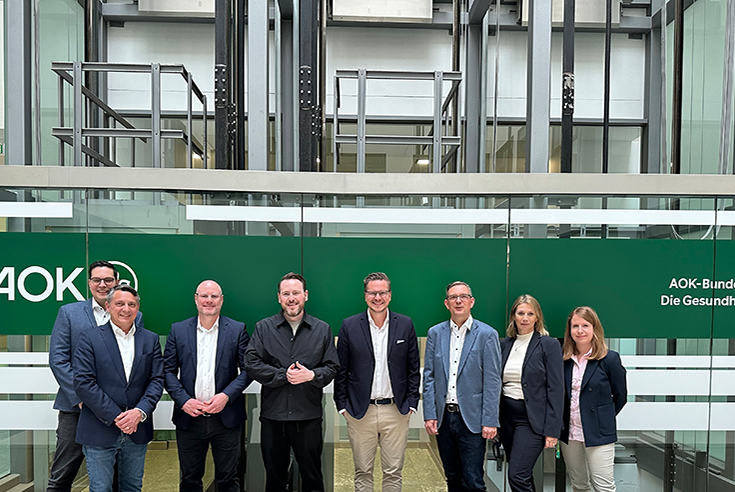
Digitization of the SHIs: Data Out of a Deep Sleep!
Data analytics in health insurance companies
Thanks to digitalization, the statutory health insurance funds (SHI funds) are sitting on natural treasures. Unfortunately, they have only used a fraction of new, data-driven business models to a fraction. Changing this takes will and movement - and it needs a partner who knows the ropes.
One thing remains certain: change. The digital transformation presents society, companies, and organizations with new challenges. And this will not diminish. Developing business models driven by data analytics is crucial for companies and organizations to stay ahead in the economy. This can be a challenge for some statutory health insurance companies, this can be a particular challenge, as they are often still attached to their home-grown, rustic systems from an IT perspective.
Anyone with access to patient and routine data from hundreds of thousands to millions of people with statutory and voluntary health insurance should be a pioneer in prediction and prevention via data analytics. However, many SHI providers are still hesitant to exploit the full potential of the data.
Movement Is Silver - Data Is Gold
The Health Data Utilization Act (GDNG) came into force on March 26, 2024. This creates the legal basis for SHI providers to use patient data to benefit patients. But this "good" must first be achieved. To this end, SHI providers must once again critically review their data management, storage, and backup, (pre-)formulate explorations, and think about possible future challenges and scaling today. However, many SHI providers are reaching their limits with data storage alone. However, movement is urgently needed to break down existing data silos and be appropriately positioned for the coming years (decades). The growing threat of cyber attacks also means that regular testing of IT systems is of immense importance: healthcare data is part of the critical infrastructure and must comply with the strict NIS 2 EU standards for IT and data security by fall 2024
To make it clear once again, We are still at the beginning of a new era. Although this can be reduced to ones and zeros, the impact on society will increase dramatically. With the GDNG as a starting point, SHI providers can determine for themselves where their journey will take them - and how quickly. With Arvato Systems as a partner, the guard rails can already be set up now, and certain stages can then be fine-tuned on an ongoing basis. We know how "Simplifying Healthcare" works in the entire healthcare sector.
Significantly Increased Benefits: Synchronizing Health Data
Until now, the data of insured persons has been stored in silos. There is data from the hospital, from the outpatient sector, routine data, socio-economic data, and vulnerable data, or even data from smartwatches. Not every SHI system needs all of its policyholders' data, and, at the same time, no one needs to reinvent the moon landing in terms of storage, backup, and analysis. However, they need to retrieve the essential data quickly in a format that allows them to draw meaningful conclusions for their policyholders or subgroups of their policyholders. The technology for this is available. In addition to the disease data mentioned above or the automatically collected data from wearables and the like, we now have another excellent treasure trove that needs to be exploited: health data! Until now, little attention has been paid to the comparison with standard data on health-related quality of life in the general treatment of illnesses and symptoms. Teaching is fundamentally based on evidence-based data and values once they have been established. However, given demographic change, established values, such as oxygen saturation in the blood, may change or be added. It can take several years for this to be reflected in teaching. That is too much time, which data analytics could significantly reduce.

Used Correctly: Data Can Heal
The plea can only go in one direction: We need something like a data trustee for health data who
- knows and deals with IT at the highest professional level
- guarantees the highest IT security and data protection standards: on-prem and in the cloud
- is very familiar with healthcare issues and data
- has long-term technical infrastructures and human resources at its disposal
- is continuously optimized at all levels
- is in contact with all relevant players in the healthcare market and
- The fastest possible data availability is guaranteed.
Arvato Systems already meets these strict criteria and also has relevant experience. Hence, I offer all decision-makers in statutory health insurance companies is to talk to us. Let's see together how we can free your data from its slumber!
Arvato Systems sees data collection, quality, and availability as among the most important milestones for the healthcare sector in terms of prevention and prediction. As a professional in digitalization in the German healthcare sector, the company knows the needs of the industry and is rising to the challenge of noticeably improving medical quality and care with the help of secure digital solutions. Health insurance companies hold a wealth of valuable healthcare data. Data-driven business models benefit not only them but also the insured.
Written by







